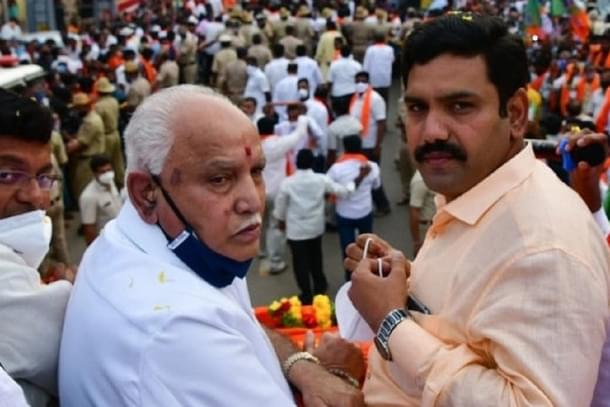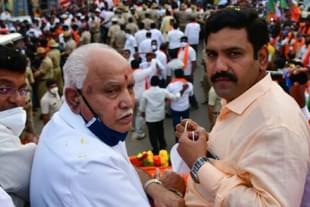Politics
In Anointing BSY Son To Head Party In Karnataka, BJP Sheds Confusion Over Who Is A Dynast
R Jagannathan
Nov 13, 2023, 01:43 PM | Updated 08:28 PM IST
Save & read from anywhere!
Bookmark stories for easy access on any device or the Swarajya app.


The appointment of B Y Vijayendra, son of former chief minister B S Yediyurappa, as president of the Bharatiya Janata Party’s (BJP's) Karnataka unit is a significant move to rebuild the party after the loss to Congress earlier this year.
More importantly, the BJP appears to have sorted out its ideological confusion over who can be called a dynast, which the party stands against.
Both before 2014 and after, the BJP’s stated policy is to work against corruption and nepotism in politics. Prime Minister Narendra Modi has repeatedly expressed himself against both “parivarvaad” and “bhrastachar”.
The party has willy-nilly made peace with the latter, having aligned itself with the Ajit Pawar-headed Nationalist Congress Party (NCP) which it had earlier dubbed as corrupt.
When it comes to standing against political dynasties, however, the BJP has not been able to clarify what precisely it means by a dynast. Is it against accommodating any son, daughter or relative of a powerful politician no matter what they bring to the party, or is it only against a presumption that only dynasts will be given important posts.
The opposition parties, which have been the targeted by Narendra Modi’s “parivarvaad” jibe, have been quick to point out that there are many sons and daughters of political figures who continue to remain in the BJP, from the Scindias to, now the son of Yediyurappa.
The BJP should not fall into the trap being set by the opposition for it on dynasty politics. Being opposed to dynasty politics does not mean denying any truly talented inheritor from being assigned important party posts or leadership. Trying to keep people who inherit a mantle from contributing to the party is self-defeating, for in politics, name recognition is an asset.
In the case of Vijayendra, he may indeed be the son of the man who built the party in Karnataka, but that is not the reason he is being given the top job in the state. It is because in the past he has proved his mettle by winning difficult seats for the party, including Sira and KR Pet.
This brings us back to the main point raised above: is this dynasty politics or merely a recognition of talent wherever it exists?
The BJP should be clear on what it means by abjuring dynasty: a dynast is not just a son, daughter or relative of someone famous or powerful. There are a few tests for determining who is an undeserving dynast, which is what the BJP should be against
One, the person should have demonstrated an ability to perform not just once but repeatedly. In politics, leading the party and delivering results are the acid test for separating true dynasts from those who may merely be related to someone in power, but has established credentials of his own.
Two, a true dynast will not be someone who can influence or decide his own appointment. Thus, any party where leadership is repeatedly inherited by relatives would be a dynasty-based party.
By this definition, Congress, NCP, BRS, Samajwadi Party, National Conference, Akali Dal, JDU and DMK are dynastic parties, but AIADMK, BJD, the two Communist parties, and the BJP are not.
Specifically, if Vijayendra is, apart from being Yediyurappa’s son, also in a position to hand over his post to his children or brother on his own, he would be a dynast. Not otherwise.
Three, an additional test would also be useful. The number of generations in which power is inherited. Once you are in the third generation, you are clearly an inheritor, even if you can demonstrate competencies.
Thus, Rahul Gandhi and Udayanidhi Stalin would qualify as dynasts, but not necessarily Ajit Pawar or Akhilesh Yadav, Tejashwi Yadav or Abhishek Banerjee.
Two are not even sons of party bosses, and the other two are just one generation down from their party founders. Their sons and daughters may, however, qualify, assuming they get into the same party based on nothing more than a relationship with the boss.
An additional filter for dynasty is not just the generational one, but the sheer number of related family members holding powerful posts. Using this filter, KCR’s Bharatiya Rashtra Samiti is clearly a dynasty-based party, as is Chandrababu Naidu’s Telugu Desam.
Determining who is a dynast needs a commonsense approach. Trying to keep talented relatives out of power merely to avoid the charge that you are promoting dynastic politics makes no sense.
In naming Vijayendra to revive the party in the state, the BJP has emerged from this definitional confusion. And yes, it may help the party reconsolidate its Lingayat votebank.
Jagannathan is former Editorial Director, Swarajya. He tweets at @TheJaggi.





